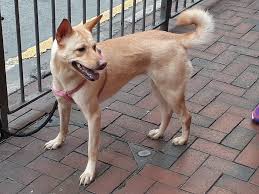
Tang Dog
Conditions of detention
Tang Dogs are adaptable and can live in a variety of environments, but they thrive best in homes with access to outdoor spaces where they can exercise and explore.
Useful Fact: Due to their history as hunting and guard dogs, Tang Dogs are well-suited for rural or suburban settings with ample space for physical activity.
Nutrition and diet
Tang Dogs require a balanced diet rich in protein to support their active lifestyle. A mix of high-quality commercial dog food and fresh, natural ingredients like meat and vegetables is ideal.
Useful Fact: Feeding them a diet that mimics their traditional diet, including lean meats and grains, can help maintain their health and vitality.
Health
Tang Dogs are generally healthy and robust, with few breed-specific health issues. Regular veterinary check-ups and a balanced diet are essential to ensure their well-being.
Useful Fact: Maintaining a healthy weight through proper diet and exercise can help prevent common issues such as joint problems and obesity.
Grooming and care
Tang Dogs have a short, dense coat that requires minimal grooming. Regular brushing helps remove loose hair and keep their coat healthy and shiny.
Useful Fact: Their coat naturally repels dirt and requires only occasional baths, making them low-maintenance in terms of grooming.
Education and training
Tang Dogs are intelligent and eager to please, making them relatively easy to train. They respond well to positive reinforcement and consistent training methods.
Useful Fact: Early socialization and training are crucial to harness their natural guarding instincts and ensure they are well-behaved around strangers and other animals.
Toys and entertainment
Tang Dogs enjoy toys that stimulate their minds and bodies, such as puzzle toys, fetch toys, and interactive games. Regular playtime is important to keep them engaged.
Useful Fact: Providing a variety of toys and activities can prevent boredom and help channel their energy into positive behaviors.
Safety
Due to their strong guarding instincts, Tang Dogs should be kept on a leash or in a secure area when outdoors to prevent them from wandering off or displaying territorial behavior.
Useful Fact: A secure, fenced yard is ideal for giving them the freedom to roam and explore safely.
Accessories
Sturdy collars, harnesses, and leashes are important for Tang Dogs, especially during training and outdoor activities.
Useful Fact: Using a harness can provide better control and prevent neck strain during walks and runs.
Socialization
Tang Dogs are loyal and protective of their families but can be wary of strangers. Early and consistent socialization is important to ensure they are comfortable in various environments.
Useful Fact: Introducing them to different people, animals, and environments from a young age helps them develop into confident and well-adjusted adults.
Travel and Transportation
Tang Dogs can travel well if they are accustomed to it from a young age. Ensuring they have a comfortable and secure space in the vehicle is important.
Useful Fact: Using a travel crate or a harness designed for car travel ensures their safety and comfort during trips.
Behavior and psychology
Tang Dogs are known for their loyalty, intelligence, and strong guarding instincts. They form strong bonds with their families and are naturally protective.
Useful Fact: Understanding their protective nature and providing proper training can help manage their behavior and ensure they are confident and well-behaved.
Legal aspects
Owners should comply with general dog ownership laws, such as licensing, vaccination requirements, and leash laws.
Useful Fact: In some areas, there may be specific regulations regarding guard breeds, so checking local laws is important.


